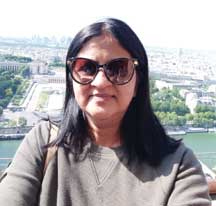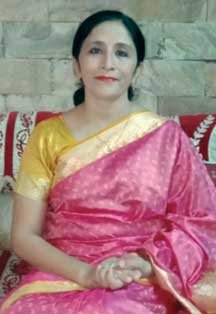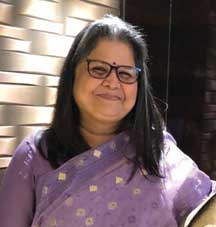
Poonam Jain has worked as a home science teacher at Banasthali University and Government College of Chandigarh. She has also worked as a primary teacher and is currently teaching in Venkateshwar School, Dwarka.
“As a teacher, I feel good teaching the subject. But if we look at it from the students’ point of view, a bit of simplification is required in some topics especially fashion merchandising. The problem is that there are weak students also since home science is an optional subject. It may be an option with math, so all those who are not academically good, take up home science. For these students it is difficult to make them understand the concepts and the language. So we make short notes for them so that they can at least pass. I’m really worried about one or two students who are dyslexic and who are not able to cope.”

Monica Joshi is a home science teacher at Dewan Public School, Meerut
“In my view, some parts of the new curriculum is fine, and some parts of the old curriculum is good. Lengthy lessons are not required. The lessons should be interactive, activity based, innovative and student friendly. For ex: there is an entire chapter on preservation – preservation, food safety and food quality, so children don’t want to listen to you. They are interested in what kind of activity you have added in this particular chapter. They want to do that. My idea is that there should be short lessons. Because it’s an optional subject, more creativity should be there. There should be questions to make it interactive and allow student feedback about the content and their learning.”
Mala is a teacher in DAV school, Jaipur. She has been teaching since 1995. She teaches students from nursery to class 12. She has also worked as a jewellery designing instructor.
“We usually take our students on a field trip once a year. A few years ago we went to this place where Bagru printing is done, so students got a first-hand experience of how the printing is done. We also ordered our uniforms from there that year. We also went to a food fair last year. This fair was organized by the government. The students saw how tests were being done for food adulteration. We also visited a weaving and screen printing factory.
“Everyone should learn home science because, with the knowledge that students gain they will be equipped to deal with problems in a scientific way. It is a mixture of science and humanities. I love this subject and I think it will be useful if it is made compulsory for all adolescents. I think that this subject is not given the importance it needs. Home science equips you to do things more efficiently in life.”

Reema Shrivastav teaches in an inclusive school
“Our school is an inclusive school and we were looking at offering this subject to our special children as this is an easier subject for them to handle because of the practicals involved in it. It is basically teaching life skills. I had two students who I taught in class 9 and 10. They did home science in their 12th too and did their careers in home science.
“This subject has been magical for these children. You know, the ability to draw out the best in them and getting them to do board exams. It’s giving them some ray of hope, that they’re able to do something. They’re learning life skills. They’re able to, if not anything else, get the document that they’re finishing a school examination, that they’re doing a board examination, which is so important for their own mental, physical and emotional well-being. Right now, I have a Down’s syndrome kid in class 9. Even if she can’t give board exams, at least she is learning life skills.”
As told to Shruti Satyajeet
